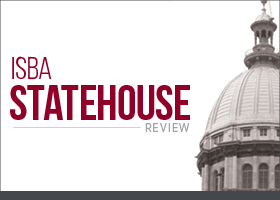ISBA Statehouse Review for January 24, 2019
 ISBA Director of Legislative Affairs Jim Covington reviews legislation in Springfield of interest to ISBA members. This week he covers the Vacancy Fraud Act, the Workplace Transparency Act, the Justice for Juveniles Program, and guardianship of minors.
ISBA Director of Legislative Affairs Jim Covington reviews legislation in Springfield of interest to ISBA members. This week he covers the Vacancy Fraud Act, the Workplace Transparency Act, the Justice for Juveniles Program, and guardianship of minors.
Creates the Vacancy Fraud Act. House Bill 832 (Martwick, D-Chicago) allows a taxing body or its representative to file a vacancy-fraud complaint with the county board of review if the property is receiving vacancy relief and the property owner is not actively attempting to lease, sell, or alter the property. It sets forth factors in determining whether vacancy fraud has occurred and its penalties. House Bill 832 was just introduced.
The Workplace Transparency Act. Senate Bill 30 (Bush, D-Grayslake) provides that employers may not require an employee or prospective employee to sign a nondisclosure agreement that contains any provision that has the purpose or effect of limiting the disclosure of sexual misconduct, retaliation, or unlawful discrimination; suppressing information relevant to an investigation into a claim of sexual misconduct, retaliation, or unlawful discrimination; impairing the ability of any person to report a claim of sexual misconduct, retaliation, or unlawful discrimination; or waiving a substantive or procedural right or remedy of any person relating to a claim of sexual misconduct, retaliation, or unlawful discrimination.
Any such provision is void as against public policy and unenforceable, and that agreements that contain such provisions that were entered into before the effective date of the Act are voidable by a party who entered into the agreement under specified circumstances.
Senate Bill 30 doesn’t prohibit a settlement agreement from containing confidentiality provisions as agreed to between the parties. Senate Bill 30 was just introduced.
Justice for Juveniles Program. Senate Bill 63 (Van Pelt, D-Chicago) provides that the chief judge of each judicial circuit may establish a Justice for Juveniles Program. It would require that juveniles arrested or detained for eligible offenses be represented by legal counsel throughout the entire custodial interrogation of the juvenile. If the chief judge does establish such a program, any oral, written, or sign language statement of a juvenile made without the presence of legal counsel during a custodial interrogation on or after the effective date of the program shall be inadmissible as evidence against the juvenile in a proceeding under this Act or in a proceeding under the criminal code. Defines “eligible offense” and “juvenile.” Senate Bill 63 was just introduced.
Guardianship of minors. House Bill 836 (Gong-Gershowitz, D-Glenview) adds another exception that gives the court jurisdiction to proceed on a petition for the appointment of a guardian or standby guardian of a minor if it finds that the minor has a living parent whose parental rights have not been terminated; the parent or parents are not presently located in the United States because of an “administrative separation”; and are unable to consent as evidenced by a sworn affidavit. It also makes these conditions a triggering event for a short-term guardianship. House Bill 836 was just introduced.

